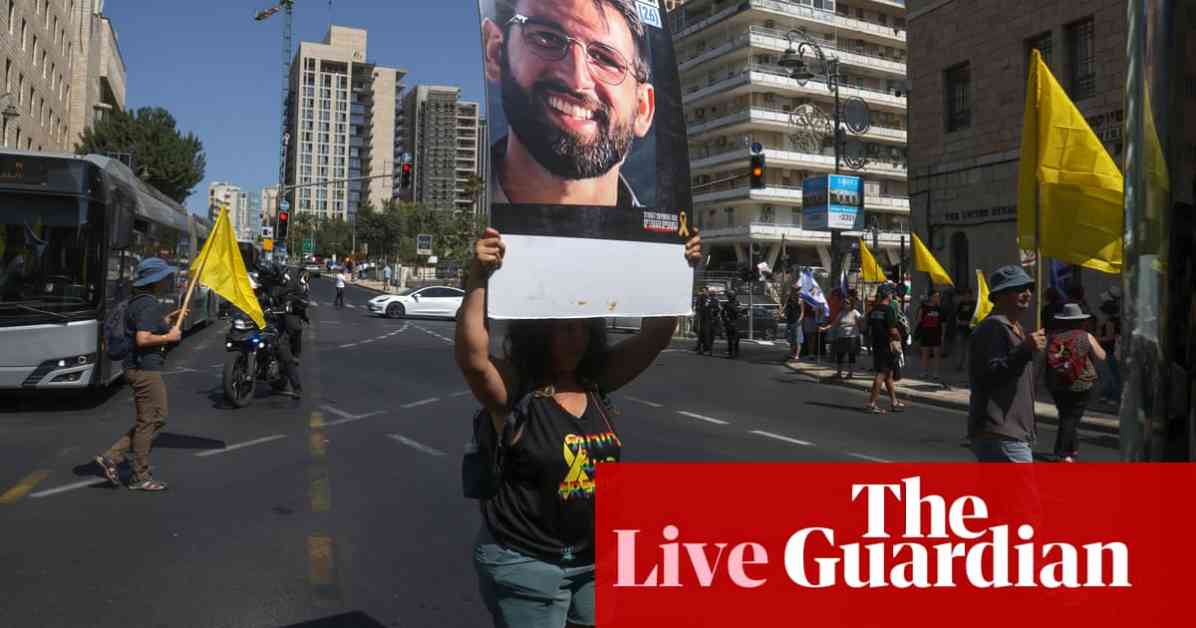Protesters in Israel have taken to the streets in a nationwide strike demanding the government secure the release of remaining hostages held by Hamas. The strike, organized by Histadrut, one of the country’s most powerful unions, began at 6am local time. Dozens of protesters blocked Ibn Gvirol Street in Tel Aviv, while others gathered at Shilat Junction near Modi’in and in the northern city of Rosh Pina.
The general strike has led to the closure of government and municipal offices, schools, and many private businesses. Even Israel’s international airport, Ben Gurion, shut down at 8am local time. The strike is expected to end at 6pm local time, according to Histadrut’s chair, Arnon Bar-David.
The strike comes amid widespread public anger at the government’s handling of the war in Gaza and the recent deaths of hostages at the hands of Hamas. The discovery of the bodies of six hostages over the weekend further fueled calls for action. Israel’s foreign minister, Israel Katz, has vowed to respond with full force to what he called a “heinous crime” committed by Hamas.
Hamas’ armed wing, al-Qassam brigades, claimed responsibility for two attacks in the West Bank that left three Israelis injured. The attacks occurred in the Karmei Tzur settlement and the Gush Etzion Junction near Hebron. Israel has promised a strong response to the attacks.
In a show of solidarity with the protesters, over 1,000 people gathered at the Ra’anana Junction north of Tel Aviv, waving hostage solidarity flags and chanting anti-government slogans. The protesters are putting pressure on Prime Minister Benjamin Netanyahu to reach a ceasefire deal and bring the remaining hostages home.
Meanwhile, in northern Israel, a protest near the town of Yokneam and in Haifa has also been reported. The demonstrations are part of a larger movement demanding action from the government to address the ongoing conflict with Hamas and secure the release of hostages.
Amid the protests and strike, the Israeli government has received a boost in its communication capabilities with the arrival of dozens of Elon Musk’s Starlink satellite systems. The satellite network aims to provide internet services to remote areas, including local authority offices, hospitals, and emergency centers in Israel.
The arrival of the Starlink systems marks a significant development in Israel’s communication infrastructure, especially in times of crisis like the current conflict with Hamas. The technology is expected to enhance connectivity and facilitate real-time communication in emergency situations.
The general strike has caused disruptions across the country, with bus and light rail services canceled or operating at reduced capacity. Workers at Israel’s main commercial port in Haifa have also joined the strike, while hospitals are operating at limited capacity and many banks are closed.
Despite the disruptions, protests continue to escalate as demonstrators block major roads and intersections in cities like Tel Aviv and Rosh Pina. The protest movement, led by the Hostages and Missing Families Forum, is demanding action from the government to secure the release of hostages and bring an end to the conflict with Hamas.
In response to the protests, the attorney general has instructed prosecutors to seek an injunction against the general strike, citing concerns about its impact on the economy and legality. The Regional Labour Court is set to hear requests for injunctions submitted by the Gevurah Forum, representing bereaved families opposed to the hostage deal.
The ongoing conflict with Hamas has also spilled over into international waters, with reports of an attack on a ship in the Red Sea by Yemen’s Houthi rebels. The attack targeted a vessel carrying Russian-origin cargo, with two projectiles hitting the ship and a third explosion nearby. The ship was able to proceed to its next port of call without casualties.
The attack in the Red Sea is just one instance of the escalating tensions in the region, as the conflict between Israel and Hamas continues to impact maritime trade and security. The international community is closely monitoring the situation, with concerns about the potential for further violence and instability.
The protests and general strike in Israel reflect the deep-seated frustrations and concerns of the public regarding the ongoing conflict and hostage situation with Hamas. The demands for action from the government are growing louder, as protesters call for a resolution to the crisis and the safe return of hostages held by the militant group.
As the protests and strike continue, the Israeli government faces mounting pressure to address the root causes of the conflict and work towards a peaceful resolution with Hamas. The international community is also closely watching the situation, with hopes for a de-escalation of tensions and a lasting ceasefire in the region.
In conclusion, the protests and general strike in Israel underscore the urgency of addressing the ongoing conflict with Hamas and securing the release of hostages held by the militant group. The public outcry and demands for action reflect the deep-seated frustrations and concerns of the Israeli people, as they call for a resolution to the crisis and a path towards peace and stability in the region.












